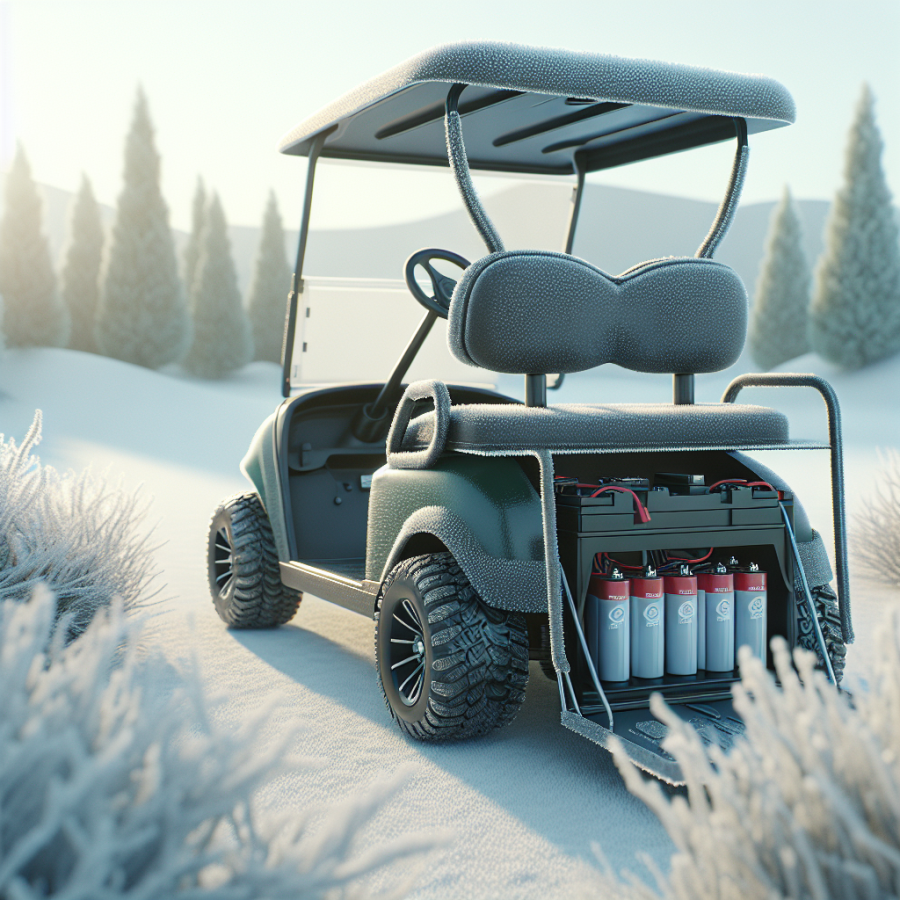Tips to Protect Golf Cart Batteries from the Impact of Cold Weather
Winter weather can wreak havoc on your golf cart batteries if you don't take the necessary precautions. While golf cart batteries are designed to be extremely durable, a freezing temperature can significantly reduce their overall lifespan and efficiency. However, there are certain steps you can take to reduce the detrimental effects.
Knowledge is the first line of defense when it comes to protecting your golf cart batteries from cold weather. It's important to know that below freezing temperatures cause the electrolyte solution in your batteries to freeze. This freezing process decreases the battery's ability to hold and distribute charge, resulting in reduced performance.
One tip to protect your golf cart batteries from cold weather is proper storage. Choosing an insulated, warm environment to keep your batteries during winter can go a long way in maintaining their lifespan. Keep in mind that it may be more than just an area that offers shelter from the snow. Instead, consider investing in a golf cart battery blanket or heater which are designed to maintain a constant and appropriate temperature.
Apart from the environmental conditions, it's also necessary to ensure that your batteries are fully charged before storing them. Batteries tend to discharge more quickly in cold conditions and a full charge can help resist freezing. Regularly topping up your batteries during the cold months could also help to avoid deep discharging which is harmful for any battery.
Periodically checking your golf cart batteries is also crucial during the winter months. Ensure the battery is clean and free from any corrosive build-up. Ensure that it’s fully functional and look out for any visible signs of damage. These could potentially be exacerbated by the freezing temperatures, leading to leaks or spills.
While the winter months can be harsh and unwelcoming, the use of distilled water instead of tap water in your batteries would help decrease the freezing point of the electrolyte solution which in turn protects batteries from freezing.
Remember, preventative maintenance is always better than cure. Investing time and effort in maintaining your golf cart batteries during the harsh winter months will not only lead to improved performance but will also save you money in the long run. Apply these tips and keep your golf cart batteries running at optimal levels, despite the freezing temperatures.
Read also:
The Gastro Gladiators: Inside the World of Competitive Eating
How Freezing Temperatures Affect the Performance of Golf Cart Batteries
The impact of freezing temperatures on golf cart batteries is a crucial topic for golfers, particularly those who reside in colder climates. An understanding of how these low temperatures affect battery performance can significantly assist in maintaining the health and longevity of your golf cart battery, and in turn, the overall experience of your golfing endeavors.
To commence with, as the temperature drops, golf cart batteries may experience a decline in capacity, or in simple words, they may not hold their charge as effectively as they do during warmer weather. The chemical reactions that take place inside the battery, which are responsible for generating electric power, slow down in colder temperatures. As a result, the battery may not generate the same amount of energy it typically would under warmer circumstances.
Next, freezing temperatures can also lead to a process known as sulfation. Sulfation happens when a lead-acid battery, commonly used in golf carts, is not fully charged. It leads to the formation of lead sulfate crystals, reducing the battery's ability to hold a charge. Cold temperatures significantly augment this process, leading to the quick deterioration of the battery.
Similarly, the electrolyte solution within the battery, which plays a vital role in the generation of electricity, can freeze at severely low temperatures. Increasing the state of charge of the battery decreases the electrolyte's freezing point. Therefore, it is vital to ensure the battery is fully charged to prevent it from freezing in extreme cold climates.
It's also important to understand that cold weather can affect the physical integrity of the battery itself. Freezing temperatures can cause the electrolyte solution inside to freeze and expand. This expansion could potentially cause the battery case to crack, leading to an acid leak which could irreversibly damage the battery.
To mitigate the adverse effects of freezing temperatures on golf cart batteries, several best practices can be implemented. These include keeping the batteries fully charged, insulating them properly during freezing weather, storing the golf cart in a warmer location or investing in battery heaters or warmers amongst others. These preventive measures not only prolong the life of the battery but also maintain an optimum level of performance during the dreaded cold weather.
Furthermore, knowing the signs of a struggling battery in cold weather can also be helpful. These signs include longer charging times, a decrease in travel range, slow starts, and reduced power supply. Understanding these signs can allow the battery owner to take necessary preventive measures.
In conclusion, freezing temperatures can significantly influence the performance and longevity of golf cart batteries.




